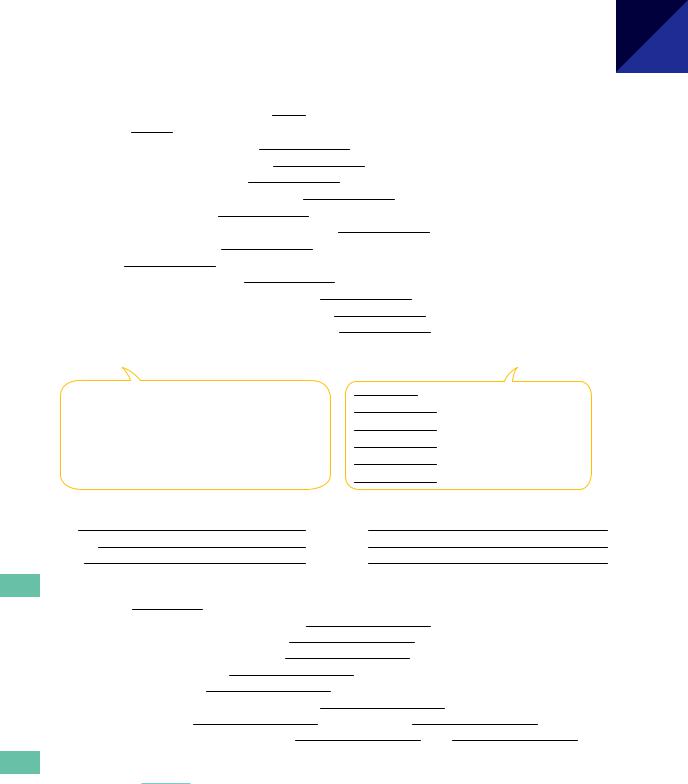
- •Contents
- •Thanks
- •To the student
- •To the teacher
- •3 Present continuous and present simple 1 (I am doing and I do)
- •10 Present perfect continuous and simple (I have been doing and I have done)
- •11 how long have you (been) … ?
- •12 for and since when … ? and how long … ?
- •13 Present perfect and past 1 (I have done and I did)
- •14 Present perfect and past 2 (I have done and I did)
- •15 Past perfect (I had done)
- •16 Past perfect continuous (I had been doing)
- •17 have and have got
- •18 used to (do)
- •19 Present tenses (I am doing / I do) for the future
- •20 I’m going to (do)
- •21 will and shall 1
- •22 will and shall 2
- •23 I will and I’m going to
- •24 will be doing and will have done
- •26 can, could and (be) able to
- •27 could (do) and could have (done)
- •28 must and can’t
- •29 may and might 1
- •30 may and might 2
- •31 have to and must
- •32 must mustn’t needn’t
- •33 should 1
- •34 should 2
- •35 I’d better … it’s time …
- •36 would
- •39 if I knew … I wish I knew …
- •40 if I had known … I wish I had known …
- •41 wish
- •42 Passive 1 (is done / was done)
- •43 Passive 2 (be done / been done / being done)
- •44 Passive 3
- •45 it is said that … he is said to … he is supposed to …
- •46 have something done
- •47 Reported speech 1 (he said that …)
- •48 Reported speech 2
- •49 Questions 1
- •52 Question tags (do you? isn’t it? etc.)
- •53 Verb + -ing (enjoy doing / stop doing etc.)
- •54 Verb + to … (decide to … / forget to … etc.)
- •55 Verb (+ object) + to … (I want you to …)
- •56 Verb + -ing or to … 1 (remember, regret etc.)
- •57 Verb + -ing or to … 2 (try, need, help)
- •58 Verb + -ing or to … 3 (like / would like etc.)
- •59 prefer and would rather
- •60 Preposition (in/for/about etc.) + -ing
- •61 be/get used to … (I’m used to …)
- •63 there’s no point in -ing, it’s worth -ing etc.
- •64 to … , for … and so that …
- •65 Adjective + to …
- •66 to … (afraid to do) and preposition + -ing (afraid of -ing)
- •67 see somebody do and see somebody doing
- •68 -ing clauses (He hurt his knee playing football.)
- •69 Countable and uncountable 1
- •70 Countable and uncountable 2
- •71 Countable nouns with a/an and some
- •74 the 2 (school / the school etc.)
- •75 the 3 (children / the children)
- •77 Names with and without the 1
- •78 Names with and without the 2
- •79 Singular and plural
- •80 Noun + noun (a bus driver / a headache)
- •81 -’s (your sister’s name) and of … (the name of the book)
- •82 myself/yourself/themselves etc.
- •83 a friend of mine my own house on my own / by myself
- •84 there … and it …
- •85 some and any
- •87 much, many, little, few, a lot, plenty
- •90 all every whole
- •91 each and every
- •92 Relative clauses 1: clauses with who/that/which
- •94 Relative clauses 3: whose/whom/where
- •95 Relative clauses 4: extra information clauses (1)
- •96 Relative clauses 5: extra information clauses (2)
- •97 -ing and -ed clauses (the woman talking to Tom, the boy injured in the accident)
- •98 Adjectives ending in -ing and -ed (boring/bored etc.)
- •99 Adjectives: a nice new house, you look tired
- •100 Adjectives and adverbs 1 (quick/quickly)
- •102 so and such
- •104 quite, pretty, rather and fairly
- •105 Comparative 1 (cheaper, more expensive etc.)
- •106 Comparative 2 (much better / any better etc.)
- •107 Comparative 3 (as … as / than)
- •108 Superlative (the longest / the most enjoyable etc.)
- •109 Word order 1: verb + object; place and time
- •110 Word order 2: adverbs with the verb
- •111 still any more yet already
- •112 even
- •114 in case
- •116 as (as I walked … / as I was … etc.)
- •117 like and as
- •119 during for while
- •121 at/on/in (time)
- •122 on time and in time at the end and in the end
- •123 in/at/on (position) 1
- •124 in/at/on (position) 2
- •125 in/at/on (position) 3
- •126 to, at, in and into
- •127 in/on/at (other uses)
- •129 Noun + preposition (reason for, cause of etc.)
- •130 Adjective + preposition 1
- •131 Adjective + preposition 2
- •132 Verb + preposition 1 to and at
- •134 Verb + preposition 3 about and of
- •135 Verb + preposition 4 of/for/from/on
- •136 Verb + preposition 5 in/into/with/to/on
- •137 Phrasal verbs 1 Introduction
- •138 Phrasal verbs 2 in/out
- •139 Phrasal verbs 3 out
- •142 Phrasal verbs 6 up/down
- •143 Phrasal verbs 7 up (1)
- •144 Phrasal verbs 8 up (2)
- •145 Phrasal verbs 9 away/back
- •Additional exercises
- •Study guide
- •Key to Exercises
- •Key to Additional exercises (see page 302)
- •Key to Study guide
- •Index

Unit
85 some and any
AIn general we use some (also somebody/someone/something) in positive sentences and any
(also anybody etc.) in negative sentences:
some |
|
any |
We bought some flowers. |
|
We didn’t buy any flowers. |
He’s busy. He has some work to do. |
|
He’s lazy. He never does any work. |
There’s somebody at the door. |
|
There isn’t anybody at the door. |
I want something to eat. |
|
I don’t want anything to eat. |
|
|
|
We use any in the following sentences because the meaning is negative:
She went out without any money. (she didn’t take any money with her)
He refused to eat anything. (he didn’t eat anything)
It’s a very easy exam. Hardly anybody fails. (= almost nobody fails)
BWe use both some and any in questions. We use some/somebody/something to talk about a person or thing that we know exists, or we think exists:
Are you waiting for somebody? (I think you are waiting for somebody)
We use some in questions when we ask for or ofer things:
Can I have some sugar, please? (there is probably some sugar that I can have)
Would you like something to eat? (there is something to eat)
But in most questions, we use any. We do not know if the thing or person exists:
Do you have any luggage? (maybe you do, maybe not)
Is there anybody in the house? (maybe there is, maybe not)
CYou can use if + any:
Let me know if you need anything.
If anyone has any questions, I’ll be pleased to answer them.
The following sentences have the idea of if:
I’m sorry for any trouble I’ve caused. (= if I have caused any trouble)
The police want to speak to anyone who saw the accident. (= if there is anyone)
DWe also use any with the meaning ‘it doesn’t matter which’:
You can take any bus. They all go to the centre. (= it doesn’t matter which bus you take)
Come and see me any time you want.
We use anybody/anyone/anything/anywhere in the same way:
We forgot to lock the door. Anybody could have come in.
Compare some- and any-:
a: I’m hungry. I want something to eat. b: What would you like?
a: I don’t mind. Anything. (= it doesn’t matter what) b: Let’s go out somewhere.
a:Where shall we go?
b:Anywhere. I just want to go out.
ESomebody/someone/anybody/anyone are singular words:
Someone is here to see you.
But we use they/them/their ater these words:
Someone has forgotten their umbrella. (= his or her umbrella)
If anybody wants to leave early, they can. (= he or she can)
170 |
not … any Unit 86 some of / any of … Unit 88 hardly any Unit 101C |

Exercises
85.1 |
Put in some or any. |
|
|
|
|
|
1 |
We didn’t buy any |
flowers. |
|
|
||
2 |
Tonight I’m going out with |
friends of mine. |
|
|||
3 |
Have you seen |
|
good movies recently? |
|
||
4 |
I’d like |
information about what there is to see in this town. |
|
|||
5 |
I didn’t have |
|
money. I had to borrow |
. |
|
|
6 |
You can use your card to withdraw money at |
cash machine. |
|
|||
7 |
Those apples look nice. Shall we get |
? |
|
|||
8 |
With the special tourist train ticket, you can travel on |
train you like. |
||||
9 |
‘Can I have |
|
more cofee, please?’ ‘Sure. Help yourself.’ |
|
||
10 |
If there are |
|
words you don’t understand, look them up in a dictionary. |
|||
11 |
We wanted to buy |
|
grapes, but they didn’t have |
in the shop. |
||
85.2 Complete the sentences with some- or any- + -body/-thing/-where.
1 |
I was too surprised to say anything . |
|
|
||
2 |
There’s |
at the door. Can you go and see who it is? |
|
||
3 |
Does |
mind if I open the window? |
|
|
|
4 |
I can’t drive and I don’t know |
about cars. |
|
|
|
5 |
You must be hungry. Why don’t I get you |
to eat? |
|
||
6 |
Emma is very tolerant. She never complains about |
|
. |
||
7 |
There was hardly |
|
on the beach. It was almost deserted. |
||
8 |
Let’s go away. Let’s go |
|
warm and sunny. |
|
|
9 |
I’m going out now. If |
|
asks where I am, tell them you don’t know. |
||
10 |
Why are you looking under the bed? Have you lost |
|
? |
||
11 |
This is a no-parking area. |
who parks their car here will have to pay a fine. |
|||
12 |
Quick, let’s go! There’s |
|
coming and I don’t want |
to see us. |
|
13 |
They stay at home all the time. They never seem to go |
|
. |
||
14 |
Jonathan stood up and let the room without saying |
|
. |
||
15 |
‘Can I ask you |
?’ |
‘Sure. What do you want to ask?’ |
||
16 |
Sarah was upset about |
|
and refused to talk to |
. |
|
17 |
I need |
to translate. Is there |
here who speaks English? |
||
18 |
Sue is very secretive. She never tells |
|
. (2 words) |
||
85.3 Complete the sentences. Use any (+ noun) or anybody/anything/anywhere.
1Which bus do I have to take?
2
When shall we meet? Monday?
3
What do you want to eat?
4
Who shall I invite to the party?
5
What sort of job are you looking for?
6
Where shall I sit?
7
Is this machine dificult to use?
Any bus |
. They all go to the centre. |
I don’t mind. |
next week |
will be OK for me.
. I don’t mind.
Whatever you have.
It’s your party. You can invite you want.
. It doesn’t matter what
it is.
It’s up to you. You can sit you like.
No, it’s easy. |
can learn |
to use it very quickly. |
|
Unit
85
171

Unit |
|
86 no/none/any |
nothing/nobody etc. |
Ano and none
We use no + noun (no bus, no shops etc.). no = not a or not any:
We had to walk home. There was no bus. (= There wasn’t a bus.)
Sarah will have no trouble finding a job. (= Sarah won’t have any trouble …) There were no shops open. (= There weren’t any shops open.)
You can use no + noun at the beginning of a sentence:
No reason was given for the change of plan.
We use none without a noun:
‘How much money do you have?’ ‘None.’ (= no money)
All the tickets have been sold. There are none let. (= no tickets let)
Or we use none of … :
This money is all yours. None of it is mine.
Compare no, none and any: |
|
I have no luggage. |
|
‘How much luggage do you have?’ |
‘None.’ or ‘I don’t have any.’ |
Ater none of + plural (none of the students, none of them etc.) the verb can be singular or plural: |
|
None of the students were happy. |
or None of the students was happy. |
B nothing nobody/no-one nowhere
You can use these words at the beginning of a sentence or alone (as answers to questions):
‘What’s going to happen?’ ‘Nobody knows. / No-one knows.’
‘What happened?’ ‘Nothing.’
‘Where are you going?’ ‘Nowhere. I’m staying here.’
You can also use these words ater a verb, especially ater be and have:
The house is empty. There’s nobody living there.
We had nothing to eat.
nothing/nobody etc. = not + anything/anybody etc. :
I said nothing. = I didn’t say anything.
Jane told nobody about her plans. = Jane didn’t tell anybody about her plans. They have nowhere to live. = They don’t have anywhere to live.
With nothing/nobody etc., we do not use a negative verb (isn’t, didn’t etc.):
I said nothing. (not I didn’t say nothing)
CAter nobody/no-one you can use they/them/their (see also Unit 85E):
Nobody is perfect, are they? (= is he or she perfect?)
No-one did what I asked them to do. (= him or her)
Nobody in the class did their homework. (= his or her homework)
DSometimes any/anything/anybody etc. means ‘it doesn’t matter which/what/who’ (see Unit 85D). Compare no- and any-:
There was no bus, so we walked home.
You can take any bus. They all go to the centre. (= it doesn’t matter which bus) ‘What do you want to eat?’ ‘Nothing. I’m not hungry.’
I’m so hungry. I could eat anything. (= it doesn’t matter what) It’s a dificult job. Nobody wants to do it.
It’s a very easy job. Anybody can do it. (= it doesn’t matter who)
172 |
some and any Unit 85 none of … Unit 88 any bigger / no better etc. Unit 106B |

Exercises
86.1 |
Complete these sentences with no, none or any. |
|
|||
1 |
It was a public holiday, so there were no shops open. |
||||
2 |
I don’t have |
any money. Can you lend me some? |
|||
3 |
We had to walk home. There were |
taxis. |
|||
4 |
We had to walk home. There weren’t |
taxis. |
|||
5 |
‘How many eggs do we have?’ |
‘ |
. Shall I get some?’ |
||
6 |
There’s nowhere to cross the river. There’s |
bridge. |
|||
7 |
We took a few pictures, but |
of them were very good. |
|||
8 |
‘Did you take lots of pictures?’ |
‘No, I didn’t take |
.’ |
||
9 |
I had to do what I did. I had |
alternative. |
|||
10 |
I don’t like |
of this furniture. It’s horrible. |
|||
11 |
We cancelled the party because |
|
of the people we invited were able to come. |
||
12 |
Everyone knows they are getting married. It’s |
secret. |
|||
13 |
The two books are exactly the same. There isn’t |
diference. |
|||
14 |
‘Do you know where Chris is?’ |
‘I’m sorry. I have |
idea.’ |
||
|
|||||
86.2 |
Answer these questions using none/nobody/nothing/nowhere. |
||||
1 |
|
What did you do at the weekend? |
Nothing . It was very boring. |
||
2 |
|
Who are you waiting for? |
. I’m just standing here. |
||
3 |
|
How much bread did you buy? |
. We already have enough. |
||
4 |
|
Where are you going? |
. I’m staying here. |
||
5 |
How many books have you read this year? |
. I don’t read books. |
|||
6 |
How much does it cost to get into the museum? |
. It’s free. |
|||
Now answer the same questions using any/anybody/anything/anywhere.
7 |
(1) |
I didn’t do anything. |
10 |
(4) |
8 |
(2) |
I’m |
11 |
(5) |
9 |
(3) |
I |
12 |
(6) |
86.3 Complete these sentences with no- or any- + -body/-thing/-where.
1 |
I don’t want anything to drink. I’m not thirsty. |
|
||
2 |
The bus was completely empty. There was |
on it. |
|
|
3 |
‘Where did you go for your holidays?’ ‘ |
. I didn’t go away.’ |
|
|
4 |
‘Can you smell gas?’ |
‘No, I can’t smell |
.’ |
|
5 |
Everybody seemed satisfied. |
complained. |
|
|
6 |
Let’s go away. We can go |
you like. |
|
|
7 |
The town is still the same as it was years ago. |
has changed. |
|
|
8 |
‘What did you buy?’ |
‘ |
. I couldn’t find |
I wanted.’ |
9 |
There was complete silence in the room. |
said |
. |
|
86.4Which is right?
1 She didn’t tell nobody / anybody about her plans. (anybody is correct)
2 The accident looked bad, but fortunately nobody / anybody was seriously injured.
3 |
I looked out of the window, but I couldn’t see no-one / anyone. |
4 |
The exam is very easy. Nobody / Anybody can pass it. |
5 |
‘What’s in that box?’ ‘Nothing / Anything. It’s empty.’ |
6 |
The future is uncertain. Nothing / Anything is possible. |
7 |
I don’t know nothing / anything about economics. |
8 |
I’ll try and answer no / any questions you ask me. |
9 |
‘Who were you talking to just now?’ ‘No-one / Anyone. I wasn’t talking to no-one / anyone.’ |
Unit
86
Additional exercise 30 (page 320) |
173 |
